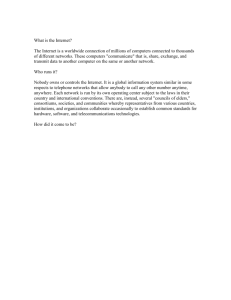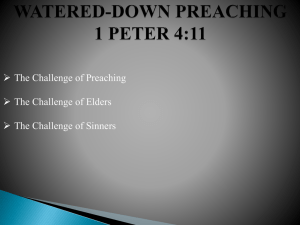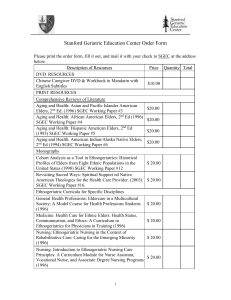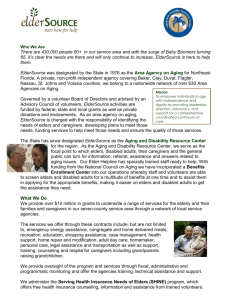Calling and Background of Elders - Wessex Synod
advertisement
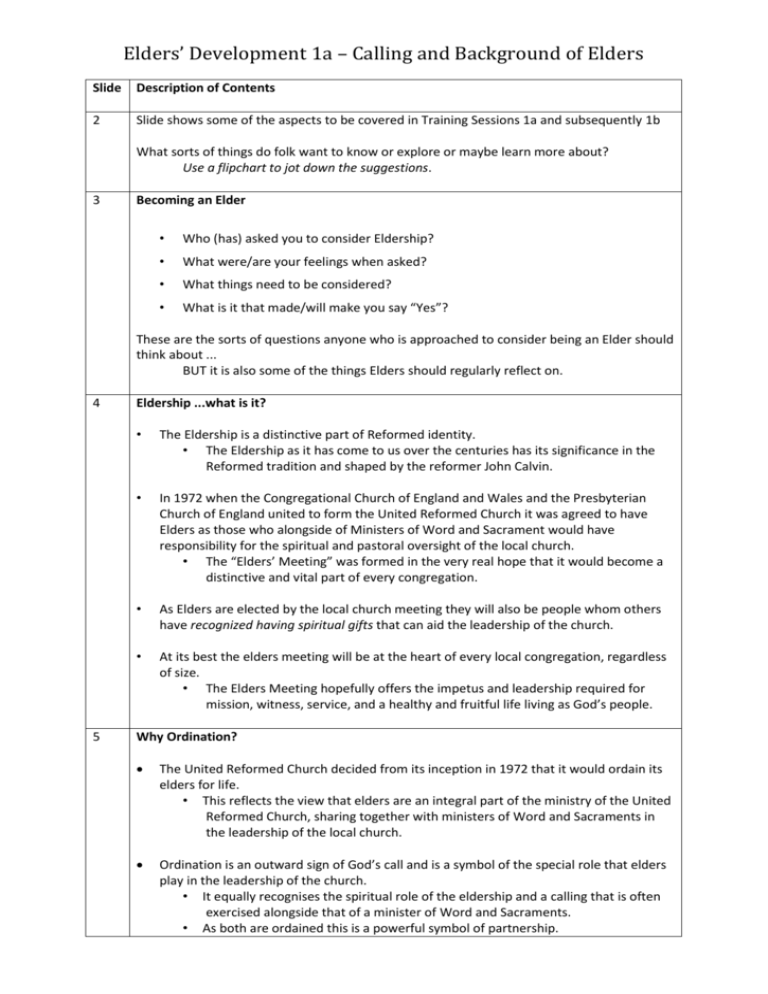
Elders’ Development 1a – Calling and Background of Elders Slide Description of Contents 2 Slide shows some of the aspects to be covered in Training Sessions 1a and subsequently 1b What sorts of things do folk want to know or explore or maybe learn more about? Use a flipchart to jot down the suggestions. 3 Becoming an Elder • Who (has) asked you to consider Eldership? • What were/are your feelings when asked? • What things need to be considered? • What is it that made/will make you say “Yes”? These are the sorts of questions anyone who is approached to consider being an Elder should think about ... BUT it is also some of the things Elders should regularly reflect on. 4 5 Eldership ...what is it? • The Eldership is a distinctive part of Reformed identity. • The Eldership as it has come to us over the centuries has its significance in the Reformed tradition and shaped by the reformer John Calvin. • In 1972 when the Congregational Church of England and Wales and the Presbyterian Church of England united to form the United Reformed Church it was agreed to have Elders as those who alongside of Ministers of Word and Sacrament would have responsibility for the spiritual and pastoral oversight of the local church. • The “Elders’ Meeting” was formed in the very real hope that it would become a distinctive and vital part of every congregation. • As Elders are elected by the local church meeting they will also be people whom others have recognized having spiritual gifts that can aid the leadership of the church. • At its best the elders meeting will be at the heart of every local congregation, regardless of size. • The Elders Meeting hopefully offers the impetus and leadership required for mission, witness, service, and a healthy and fruitful life living as God’s people. Why Ordination? The United Reformed Church decided from its inception in 1972 that it would ordain its elders for life. • This reflects the view that elders are an integral part of the ministry of the United Reformed Church, sharing together with ministers of Word and Sacraments in the leadership of the local church. Ordination is an outward sign of God’s call and is a symbol of the special role that elders play in the leadership of the church. • It equally recognises the spiritual role of the eldership and a calling that is often exercised alongside that of a minister of Word and Sacraments. • As both are ordained this is a powerful symbol of partnership. 6 7 This means that you are ordained as an elder of the United Reformed Church for life. • However this does not mean you are committed to always being a serving elder. The term of service is usually for a three year period which is renewable by agreement of Church Meeting and the elder concerned. • Many churches deploy a mandatory sabbatical period of at least a year after serving six years. However this is different from church to church. • Those who are not serving are referred to as non-serving elders although there is a suggestion they should be known as supporting elders. Ordination as an elder means that you become an elder of the United Reformed Church, and not just an elder of your local congregation. • This means that your ordination is recognised across the denomination so if you move to another part of Britain in the future and join another United Reformed Church congregation your ordination is still valid. To become an elder is a privilege and also a responsibility. • A key feature of eldership is being called to be part of a team. It is therefore important to ask yourself the question “how do I see myself as a team member?” • To be an Elder is a commitment of faith, gifts and of your time. Ask yourself: Is being an elder a priority to which I feel called and am willing to give my time and energy to? Elders in the Old Testament • The Hebrews had Elders when Moses returned to Egypt to lead them to freedom ... • Elders acted on behalf of the people • Numbers 11:16ff shows leadership being placed in the hands of a group of Elders rather than in a single Elder. • Eldership was a calling and equipping to undertake the work • Elders were from the community which they served so their judgements flowed not just from Law and Custom but from intimate knowledge of the persons in the community. • The community aspect of the Eldership stands in stark contrast to modern bureaucracy which tends to create distance between individuals and those who decide civil/criminal issues that might affect them. • Elders continued to play a role in Israel’s life from the Exodus through the dark days of the Judges and Babylonian captivity to the return of the Exiles including a role in local and national government during Jesus’ earthly ministry. • The Elders spoken of in the Gospels and early parts of Acts were apparently lay members of the council responsible for administering Jewish Law. • The Council of Seventy was located in Jerusalem but had authority over all Jews no matter where they lived. Elders in the Early Church • The book of Acts quickly picks up the term “elder” (presbyteros) and applies it to leaders in the Christian church. • It seems that missionaries appointed elders in relatively new Christian communities (Acts 14:23; Titus 1:5) • Role of the Biblical elder is indistinct but a number of features are evident: a) The men were spiritual leaders of the local congregation b) They functioned in teams rather than individually c) They were carefully selected to meet specific moral and personal criteria. • Paul's letters to Timothy and Titus outline personal requirements for leadership in the church. • In each passage demonstrated Christian characteristics are emphasised; spiritual leaders are to provide living examples of what they teach. • Nowhere in the New Testament does it state where elders came from or how they were selected but rather what they do. • The appointment of elders is mentioned in both acts and Titus. • The term "appointed" did not imply apostolic selection of elders; and it does indicate a official apostolic recognition and installation. • Scripture gives no well-defined job description for elders. • We do know that elders functioned within local congregations and assembled with other elders to consider matters and affected Christians everywhere. • The role of elder requires distinctive spiritual gifts, as well as developed Christian character. • Main Functions of Eldership in the early church: · Pastoral ministry: elders take care of the church · Overseeing ministry: elders give order and direction to the church · Healing ministry: elders bring the wholeness of Christ to the church · Teaching ministry: elders instruct the church Questions for general discussion: Which one of the “Main Functions” of Eldership above best describes you as an Elder? Which one least describes you as an Elder? Is this how you see Eldership in your church as a whole? 8 Scripture texts relating to “qualifications” of Elders and Overseers Hand out copies for information (and discussion as well) 9 Exploring Some Ideas about Elders The graphic on the slide was created from a “Wordle” showing the most common ideas and words about Eldership occuring in the following NT passages ... • Romans 12:1-8 • 1 Corinthians 12:27-31 • 1 Peter 5:1-4 • Ephesians 4:11-16 • In small groups get people to share and discuss significant ideas or words about eldership that they have thought about, heard about, or discovered in some of the Scripture passages above. (Give this is a handout) 10 Eldership NOW ...what has (if anything) changed? After group feedback has been received about ideas and words that are significant about eldership in the biblical passages (from previous slide and handout) get folk to again in small groups share and explore how they see or think eldership in our present circumstances has changed from that in the Bible passages. Let them give feedback into the larger group about this.... 11 Called to be Elders In the URC we look back to 16th century Reformers who sought a return to the New Testament patterns of Ministry. • Luther stressed that God's grace was sufficient for all and therefore no need for the authority of bishops. • Calvin stressed the priesthood of all believers. The Scottish Reformation looked at the election of elders initially every year but by 1578 indicating that elders were elected for life. The elders’ primary function was the discipline of people and ministers. Congregationalism looked at Deacons being elected to serve a table in the business of the church. In the Churches of Christ the ministers of the Word were primarily peripatetic so that some elders were "Presiding Elders" as well as having deacons. 12 Elders and Spiritual Leadership • The concept of spiritual leadership may be said to have two key elements: • Leadership by the Spirit • Leadership of the Spirit • When elders are ordained we are asking the Holy Spirit to empower these people, through the authority of the church, to undertake a ministry in the church. • This reference to leading by the Spirit highlights that the role involves much more than taking care of practical issues relating to buildings and finance, although the spiritual nature of these activities should not be overlooked. • As well as being led by the Spirit, elders are also expected to lead the mission of their local church by the power of the spirit. They need to be people of prayer, who believe that through reading the Bible and through sharing together, God’s people are able to discern God’s will for them. They also need to be servants of the church, along with any minister of word and sacrament. • Look at the ordination prayer and words from the Basis of Union (provide copies as necessary) - What do they say to us today? - Are there any surprises? Reflecting on your Eldership We would expect Elders to be people who will ask themselves: • What is the Holy Spirit saying to us? • How does the Spirit speak to the whole church through the church meeting? • How can we grow together in the gifts God has given us? • How can this eldership provide spiritual leadership to the church? • Are these questions you are comfortable asking yourselves? If so, what are your answers? • If not, what help do you need to gain this confidence?

